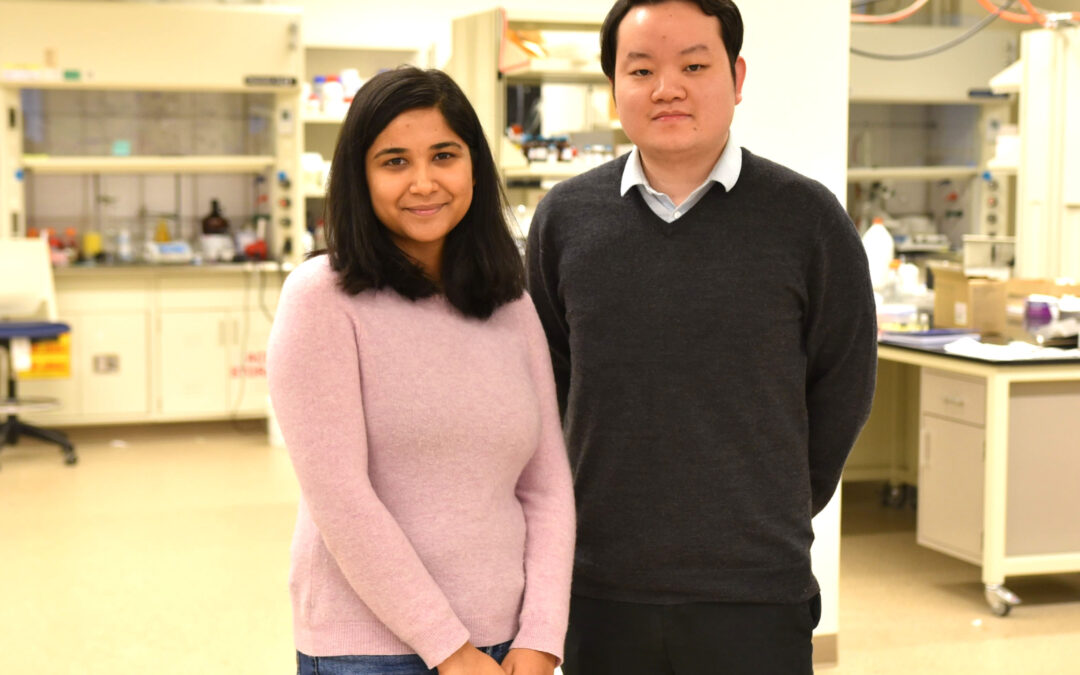Cancer Center at Illinois researcher Hua Wang is pictured here with graduate student Rimsha Bhatta, on his left, who has worked in Wang’s research lab since 2020.
An Illinois research team led by Cancer Center at Illinois (CCIL) scientist Hua Wang, a professor of materials science and engineering, has developed a biomaterial for T cell immunotherapy that can stimulate and expand function T cells in the body. The biomaterial is an injectable, T cell-responsive, microporous hydrogel that can expand T cells in vivo in a T cell-responsive manner and shows promising results for more efficient and effective in vivo T cell therapy with the possibility of greater antitumor efficacy.
Because of the limitations and risks inherent in current T cell therapy – the several weeks needed to expand sufficient T cells in vitro and the lack of control over the adoptively transferred T cells – Wang’s lab sought to develop an innovative in vivo solution by which T cells could be expanded in situ, or in the existing position in the body, thus greatly shortening the ex vivo processing time of existing T cell therapy and providing a means to activate the adoptively transferred T cells. This new T cell-responsive, microporous gel provides a platform for in vivo expansion of engineered T cells in a controlled manner for more timely and effective disease treatment.
T cells play an important role in cancer immunotherapy, but the scope of T cell therapy is currently limited to a small range of blood cancers. “T cell therapy holds tremendous potential for treating various types of cancers,” said Wang. “But treating solid tumors remains a great challenge.” Despite this grand challenge, Wang is not deterred, and the results produced in his lab provide hope for the future of T cell therapy.
CD8-positive T cells are an important type of immune cells in the body responsible for recognizing and eliminating cancer cells and pathogens, and T cell therapy is a type of immunotherapy employed to isolate T cells from the patient’s blood, modifying them ex vivo to make them able to recognize tumor cells, and then infusing back to the patient.
One feature of this ‘great challenge’ in current T cell therapy methodology is that the extracted T cells may lose function after infusion back to the body. Often, a high number of CD8-positive T cells have to be administered over successive infusions, which increases the toxicity of T cell therapy.
But the innovative biomaterial designed in Wang’s lab could remedy these problems. This current project is one step in Wang’s larger goal to develop a macroporous material system that can stimulate and expand T cells in vivo, which could reduce the initial amount of T cells needed to achieve comparable or better antitumor efficacy.
“When T cells arrive at the biomaterial, they can trigger the release of activation cues within the microporous material to further activate and expand T cells in situ. This system could serve as a training camp for T cells and increase the number of functional T cells in vivo over an extended amount of time which may lead to amplified T cell response and antitumor efficacy,” said Wang.
Wang’s lab focuses on cancer immunotherapy, especially therapeutic cancer vaccines and T cell therapy. They are also working on developing materials that can recruit and modulate immune cell in situ as a means to orchestrate the systemic immune responses against diseases such as cancer.
“Our team is working, ultimately, to develop better and safer cancer immunotherapies that could eventually save lives,” said Rimsha Bhatta, a doctoral student in Wang’s lab and the first author on their recently published paper in the journal Biomaterials.
“With a goal of developing effective immunotherapies that one day can be translated clinically and benefit patients,” Wang said, “we are fully motivated to better understand the crosstalk between cancer and the immune system, and further steer the immune system toward favoring cancer treatment.”
—
Editor’s notes:
Hua Wang is a Cancer Center at Illinois (CCIL) researcher, and an Assistant Professor in the Department of Materials Science and Engineering, the Department of Bioengineering, the Department of Biomedical and Translational Sciences, and the Materials Research Lab. Wang is also affiliated with the Beckman Institute for Advanced Science and Technology and the Carl R. Woese Institute for Genomic Biology.
To contact Hua Wang, email huawang3@illinois.edu
This work was supported by NSF DMR 2143673 CAR and NIH R01CA274738.
The paper “T cell-responsive macroporous hydrogels for in situ T cell expansion and enhanced antitumor efficacy” is available online. DOI: doi.org/10.1016/j.biomaterials.2022.121972
Written by Jonathan King, CCIL Communications Team
Editor’s notes:
Story by Jonathan King, CCIL Communications Specialist

